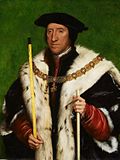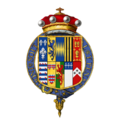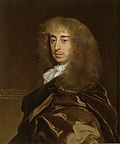List of Lords Deputy
Lordship of Ireland
| Portrait or Arms | Name (Birth–Death) | Nationality | Term of office | Monarch | Ref. | ||
|---|---|---|---|---|---|---|---|
| Took office | Left office | Time in office | |||||
| Thomas de la Dale (c. 1316–1373) | English | 1365 | 1366 | Edward III | |||
| Thomas Mortimer (c. 1350–1399) | English | 1382 | 1383 | Richard II | |||
| Thomas FitzGerald, 7th Earl of Kildare (c. 1421–1477) | Anglo-Irish | 1454 | 1459 | Henry VI | |||
| William Sherwood (died 1482) | English | 1462 | 1462 | Edward IV | |||
 | Thomas FitzGerald, 7th Earl of Desmond (died c. 1467) | Anglo-Irish | 1463 | 1467 | |||
 | John Tiptoft, 1st Earl of Worcester (1427–1470) | English | 1467 | 1468 | |||
| Thomas FitzGerald, 7th Earl of Kildare (c. 1421–1477) | Anglo-Irish | 1468 | 1475 | ||||
| Henry VI | |||||||
| Edward IV | |||||||
| William Sherwood (died 1482) | English | 1475 | 1477 | ||||
 | Gerald FitzGerald, 8th Earl of Kildare (c. 1456–1513) | Anglo-Irish | 1477 | 1477 | |||
| Henry Grey, 4th Baron Grey of Codnor (c. 1435–1496) | English | 1478 | 1479 | ||||
 | Gerald FitzGerald, 8th Earl of Kildare (c. 1456–1513) | Anglo-Irish | 1479 | ?1494 | |||
| Edward V | |||||||
| Richard III | |||||||
| Henry VII | |||||||
| Walter Fitzsimon (died 1511) | Anglo-Irish | 1492 | 1492 | ||||
| Robert Preston, 1st Viscount Gormanston (1435–1503) | Anglo-Irish | 1493 | 1494 | ||||
 | Edward Poynings (c. 1459–1521) | English | 1494 | 1496 | |||
 | Gerald FitzGerald, 8th Earl of Kildare (c. 1456–1513) | Anglo-Irish | 1496 | 1513 | |||
| Henry VIII | |||||||
 | Gerald FitzGerald, 9th Earl of Kildare (c. 1487–1534) | Anglo-Irish | 1513 | 1518 | |||
| Sir Maurice Fitzgerald | Anglo-Irish | [2] | |||||
 | Thomas Howard, Earl of Surrey (1473–1554) | English | 1520 | 1522 | [3] | ||
 | Piers Butler, 8th Earl of Ormond (c. 1467–1539) | Anglo-Irish | 1522 | 1524 | |||
 | Gerald FitzGerald, 9th Earl of Kildare (c. 1487–1534) | Anglo-Irish | 1524 | 1529 | |||
| William Skeffington (c. 1465–1535) | English | 1529 | 1532 | ||||
 | Gerald FitzGerald, 9th Earl of Kildare (c. 1487–1534) | Anglo-Irish | 1532 | 1534 | |||
| William Skeffington (c. 1465–1535) | English | 1534 | 1535 | ||||
| Leonard Grey, 1st Viscount Grane (died 1541) | English | 1536 | 1540 | ||||
Kingdom of Ireland
| Portrait or Arms | Name (Birth–Death) | Nationality | Term of office | Monarch | Ref. | ||
|---|---|---|---|---|---|---|---|
| Took office | Left office | Time in office | |||||
 | Anthony St Leger (c. 1496–1559) | English | 1540 | 1548 | |||
| Edward VI | |||||||
| Edward Bellingham (1506–1549) | English | 1548 | 1549 | ||||
| Lord Justices | 1549 | 1550 | |||||
 | Anthony St Leger (c. 1496–1559) | English | 1550 | 1551 | |||
| James Croft (c. 1518–1590) | English | 1551 | 1552 | ||||
| Lord Justices (1552–1553) | |||||||
 | Anthony St Leger (c. 1496–1559) | English | 1553 | 1556 | |||
| Mary I | |||||||
 | Thomas Radclyffe, 3rd Earl of Sussex (c. 1525–1583) | English | 1556 | 1558 | [4] | ||
 | Thomas Radclyffe, 3rd Earl of Sussex (c. 1525–1583) (as Lord Lieutenant) | English | 1560 | 1564 | Elizabeth I | [5] | |
| Nicholas Arnold (1507–1580) | English | 1564 | 1565 | ||||
 | Henry Sidney (1529–1586) | English | 1565 | 1571 | [6] | ||
| William FitzWilliam (1526–1599) | English | 1571 | 1575 | ||||
 | Henry Sidney (1529–1586) | English | 1575 | 1578 | [7] | ||
| Arthur Grey, 14th Baron Grey de Wilton (1536–1593) | English | 1580 | 1582 | ||||
 | John Perrot (1528–1592) | Welsh | 1584 | 1588 | |||
| William FitzWilliam (1526–1599) | English | 1588 | 1594 | ||||
 | William Russell, 1st Baron Russell of Thornhaugh (died 1613) | English | Appointed 16 May 1594; sworn in 11 August 1594 | 1597 | [8] | ||
 | Thomas Burgh, 3rd Baron Burgh (c. 1558–1597) | English | 1597 | 1597 | |||
 | Robert Devereux, 2nd Earl of Essex (1565–1601) | English | 1599 | 1599 | |||
 | Charles Blount, 8th Baron Mountjoy (1563–1606) (as Lord Lieutenant 1603–1604) | English | 1600 | 1603 | |||
| James VI and I | |||||||
 | George Carey (c. 1541–1616) | English | 1603 | 1604 | |||
 | Arthur Chichester, 1st Baron Chichester (1563–1625) | English | 1605 | 1616 | [9] | ||
 | Oliver St John, 1st Viscount Grandison (1559–1630) | English | 1616 | 1622 | [10] | ||
 | Henry Cary, 1st Viscount Falkland (c. 1575–1633) | English | 1622 | 1629 | |||
| Charles I | |||||||
 | Thomas Wentworth, 1st Earl of Strafford (1593–1641) | English | 1632 | 1640 | |||
 | Christopher Wandesford (1592–1640) | English | 1640 | 1640 | |||
 | Robert Sidney, 2nd Earl of Leicester (1595–1677) (as Lord Lieutenant) | English | 1640 | 1643 | |||
 | James Butler, 1st Duke of Ormond (1610–1688) (as Lord Lieutenant) | Anglo-Irish | 1644 | 1650 | |||
 | Henry Ireton (1611–1651) | English | 1650 | 1651 | |||
 | Charles Fleetwood (c. 1618–1692) | English | 1652 | 1657 | |||
 | Henry Cromwell (1628–1674) (as Lord Lieutenant 1658–1659) | English | 1657 | 1658 | |||
 | Edmund Ludlow (c. 1617–1692) | English | 1659 | 1660 | |||
 | George Monck, 1st Duke of Albemarle (1608–1670) | English | 1660 | 1661 | |||
 | James Butler, 1st Duke of Ormond (1610–1688) | Anglo-Irish | 1662 | 1668 | |||
 | Thomas Butler, 6th Earl of Ossory (1634–1680) | Anglo-Irish | 1668 | 1669 | |||
 | John Robartes, 1st Earl of Radnor (1606–1685) | English | 1669 | 1670 | |||
 | John Berkeley, 1st Baron Berkeley of Stratton (1602–1678) | 1670 | 1672 | ||||
 | Arthur Capell, 1st Earl of Essex (c. 1631–1683) | English | 1672 | 1677 | |||
 | James Butler, 1st Duke of Ormond (1610–1688) | Anglo-Irish | 1677 | 1682 | |||
 | Richard Butler, 1st Earl of Arran (1639–1686) | Anglo-Irish | 1682 | 1684 | |||
 | James Butler, 1st Duke of Ormond (1610–1688) | Anglo-Irish | 1684 | 1685 | |||
| Lords Justices | 24 February 1685 | ||||||
 | Henry Hyde, 2nd Earl of Clarendon (1638–1709) | English | 1685 | 1687 | |||
 | Richard Talbot, 1st Earl of Tyrconnell (c. 1630–1691) | Irish | 1687 | 1688 | |||
The title subsequently became Lord Lieutenant of Ireland , with the holder also known informally as the Viceroy.